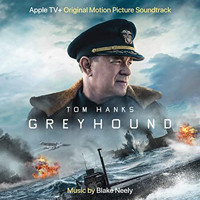- Composed by Blake Neely
- Lakeshore / 77m
In post-production for years, when it was finally ready there was a global pandemic on and so Greyhound became an Apple original. It’s pretty good – a passion project for Tom Hanks, who wrote it and stars as a naval commander navigating the Atlantic crossing during WWII, leeding a fleet under siege from U-boats while out of range of air support from the continents in either direction.
Blake Neely is a kind of house composer for Hanks’s Playtone when it makes tv shows and so it wasn’t much of a surprise to see him make his own crossing, to the “big” screen, for this. I remember when Dunkirk came out – a score I thought just didn’t work at all – thinking “hmm, I guess this is what war movies are going to sound like for a while now” – and clearly that’s what Neely was going for here. You can imagine what someone like James Horner would have done for this movie had he still been around – you can imagine it very clearly because it would probably have been The Perfect Storm with a military filter applied – but I have to acknowledge that was twenty years ago and things move on. (The person who, under various different names, always comments about me being too hung up on the past and constantly encourages me to “retire” from my highly-lucrative career as a film music blogger – here’s your moment, pal!)

Much of the body of the score is constructed of building blocks of visceral tension – the chugging action ostinatos are what you might expect, but the sheer intensity of the overall sound design is perhaps not – amongst the pulses, beats and general electronic chaos, Neely sometimes injects sudden blasts of a crisp, clean orchestra – and it does have an impact then. It gets a bit Mad Max: Fury Road at times – which obviously isn’t welcome – but I have to say that in some of the (many) action sequences on the album, the intensity is really quite effective. So, too, the way the composer handles the orchestra – this is not your standard 2020 orchestrated keyboard music, there are interesting textures and techniques used (listen to the brass playing in “Surrounded” – could have been written by Elliot Goldenthal).
I’m not entirely sold on some of the electronic devices used in the score which are basically sound effects – a weird whale call sound used to represent the U-boats just sounds, well, a bit weird; and the variant on Dunkirk‘s ticking clock sounds less like a heartbeat and more like a helicopter rotor (wrong war).
A few minutes of the action music is one thing but it does go on and on – indeed, that’s the whole point of the film, so I’m not saying this like it’s an inappropriate thing – and is very monochrome. Making the album 77 minutes long is going to stretch anyone’s patience: it’s nearly as long as the unusually short film, and I suspect Neely’s music would have shone much more in a more judicious presentation.
Dunkirk‘s catharsis came in the form of British patriotism, from Elgar; this time round it’s American, and it’s original. That theme actually appears as early as the opening cue, “First Crossing”, though it’s rather subtly incorporated at that point. Before we get there, there’s a full secondary theme which is given a complete airing in the reflective “Lost Souls” – noble and heroic, it’s very nice (and particularly welcome on the album as a brief respite from all the action around it). The Americana theme is unleashed fully in the concluding “But At What Cost?” and it’s really good – along the lines of the theme from The Pacific in fact, a miniseries co-scored by Neely a number of years ago.
I sat through the film without really even noticing there was any music in it, mostly – listening to the album that’s hard to understand because this is not a subtle score, indeed it’s genuinely very intense for much of its running time. It’s very modern – obviously Dunkirk but also elements of the scores from the Nolan Batman films – and at times borderline unpleasant, but never to the extent of its musical inspiration. When that Americana theme does get revealed in its entirety it’s hugely impressive. The album’s far too long for me to want to listen to it again, but there are moments which are worth returning to and the ten-minute finale is genuinely great.
Rating: ** 1/2
facebook.com/moviewave | twitter.com/MovieWaveDotNet | amazon.com












I’m a fan of Neely’s music for the DC TV series filled with thematic continuity throughout it’s run (it started in 2012!) And I was hoping for this when I watched the film… Perhaps that what was asked for him to do, it’s just sad.
Its a difficult tightrope act to walk with a war movie. Wanting to honour the courage under fire without stooping to obvious emotional manipulation.
There has been a move away from having an overt melodic musical presence to something more textural (going back all the way to a much earlier war movie starring Tom Hanks, “Saving Private Ryan” and that same year’s “The Thin Red Line”).
Blake Neely has shown himself capable of more distinctly melodic work in the past, but maybe its not a surprise given prevailing trends that he has opted for the more safe, unobtrusive route with this score.
This is a really well written review that hits upon all the pertinent dilemmas and potential pitfalls of scoring this sort of film.